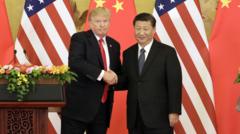In an effort to mitigate tension surrounding South Africa's land reform legislation, President Cyril Ramaphosa reached out to tech entrepreneur Elon Musk after President Trump's critical comments regarding the new law.
South Africa's President Engages Elon Musk in Land Law Dispute

South Africa's President Engages Elon Musk in Land Law Dispute
President Ramaphosa seeks to ease tensions with the US by addressing land reform concerns via a call to Musk.
The dialogue followed Trump's threats to withdraw U.S. funding over claims of land confiscation without due process. Musk, a South African native and advisor to Trump, criticized the legislation on social media, prompting Ramaphosa to clarify South Africa's commitment to upholding constitutional values of justice and equality during their conversation.
Ramaphosa's recent law permits land expropriation without compensation, aimed at addressing historical injustices connected to apartheid-era land distribution. This contentious topic has sparked a national debate about ownership and racial inequality, with more than 72% of privately owned farmland still held by white individuals decades after apartheid's end. Critics warn of potential repercussions reminiscent of Zimbabwe's economy post-land seizure reforms.
In a robust defense, Ramaphosa assured that his administration has not confiscated any land and emphasized the legislation's criteria for expropriation being guided by public interest. The conversation serves as a critical step in fostering international relations while navigating the complex legacy of land ownership in South Africa.
In 1994, the country transitioned to democracy under Nelson Mandela, yet the inherited system still weighs heavily on today's policies, underlining the precarious balance the government must maintain between economic progress and redressing past injustices.
As the debate continues, the government faces pressure to achieve effective land reform without jeopardizing foreign investment.
Ramaphosa's recent law permits land expropriation without compensation, aimed at addressing historical injustices connected to apartheid-era land distribution. This contentious topic has sparked a national debate about ownership and racial inequality, with more than 72% of privately owned farmland still held by white individuals decades after apartheid's end. Critics warn of potential repercussions reminiscent of Zimbabwe's economy post-land seizure reforms.
In a robust defense, Ramaphosa assured that his administration has not confiscated any land and emphasized the legislation's criteria for expropriation being guided by public interest. The conversation serves as a critical step in fostering international relations while navigating the complex legacy of land ownership in South Africa.
In 1994, the country transitioned to democracy under Nelson Mandela, yet the inherited system still weighs heavily on today's policies, underlining the precarious balance the government must maintain between economic progress and redressing past injustices.
As the debate continues, the government faces pressure to achieve effective land reform without jeopardizing foreign investment.



















